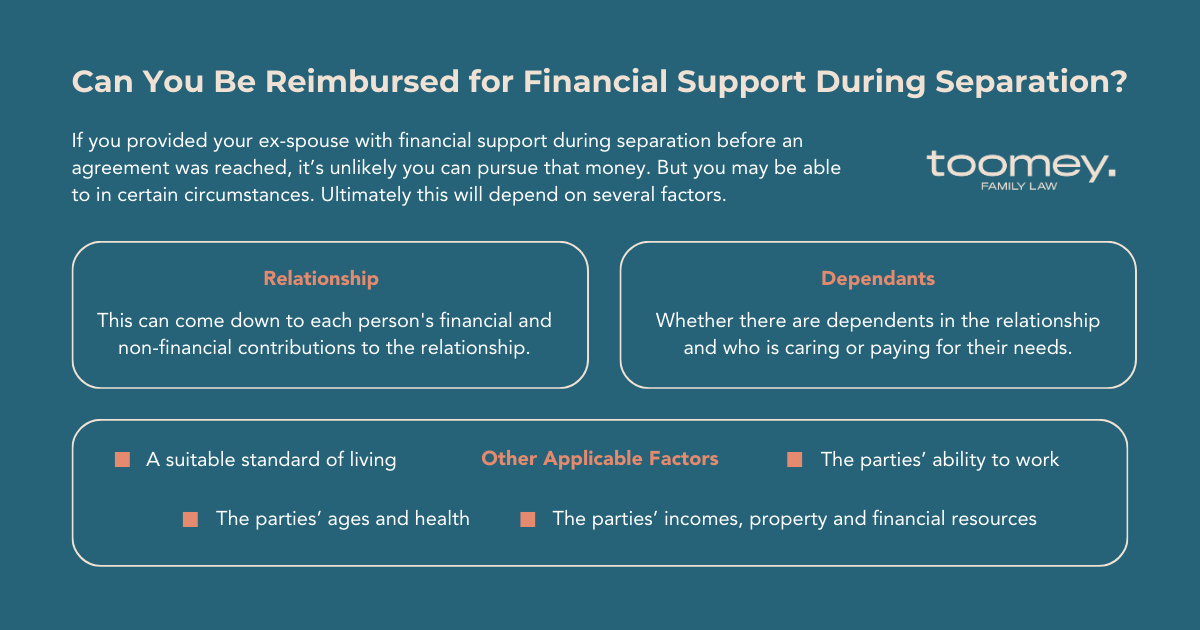
28 Feb Can I be reimbursed for the financial support I provided during separation?
The separation phase of a relationship can be complicated. Not only are you navigating heavy emotional currents, but there are also plenty of financial considerations to traverse.
Most likely, you’re hoping to reach an amicable agreement. One in which all parties feel respected, heard and satisfied. But things aren’t always as simple as that.
In some relationships, there may be one partner who is the primary income earner. The other partner may have taken on more unpaid labour by offering non-financial contributions to the relationship, in terms of domestic household and/or caregiving duties, for example. One party may have more financial burdens than the other, or be in a more vulnerable position.
When a relationship dissolves, this can muddy the financial arrangement. It can create confusion between parties around who should provide what.
If you are the key provider, you may continue to offer financial support during separation. But you may be wondering if you can get this money back post-settlement. What are your rights?
Let’s explore the obligations and expectations around providing financial support during separation.

What is separation?
First, let’s look at what the legal world considers ‘separation’. Separation is when a relationship comes to an end. That can be a marriage or a de facto relationship. Only one person needs to want the separation – the other party doesn’t have to agree.
Separation occurs when a party to a couple decides to no longer live together as a couple. This can happen in two ways: one party moves out, or both parties find separate residences. Alternatively, the couple may continue living in the same home but lead separate lives. This is known as “separation under one roof.” In this situation, the separated couple typically sleep in different beds, have changed their socialising and meal-sharing patterns, and so forth.
Unlike divorce, there is no official legal process required to confirm your separation. However, you will need to sort out your finances.

Providing financial support during separation
Life goes on after a separation. While the couple tries to untangle themselves financially, wages may still be received. Super will continue to grow. Mortgages will need to be paid. Kids will have to be fed.
If the way the couple has always operated is by one party financially supporting the other, this is unlikely to change immediately. Ultimately, separating couples must decide how to divide their property, debt and finances, also known as a “Property Settlement”. But until an official agreement is reached, one party may continue providing financial support to an ex-partner.
Can you be reimbursed for financial support during separation?
If you provided your ex-spouse with financial support during separation before an agreement was reached, it’s unlikely you can pursue that money. But you may be able to in certain circumstances. Ultimately this will depend on several factors.
These are:
- The circumstances of the financial relationship. Context is everything. What are the circumstances of your financial relationship? Does one party make more financial contributions than the other? Does one party make more non-financial contributions? How were things like mortgage repayments, groceries and other bills paid for before separation?
If one partner has a genuine financial need, and the other has the capacity to support them, it is unlikely that financial support during separation will be ordered to be repaid.
According to the Federal Circuit and Family Court of Australia, ‘Under the Family Law Act 1975, a person has a responsibility to financially assist their spouse, or former de facto partner, if that person cannot meet their own reasonable expenses from their personal income or assets.’
It adds that this responsibility can continue even after the parties have separated or divorced.
- Whether you have dependents and who is caring and paying for their needs. Do you have any dependents? How are their financial needs being met? With whom do they live?
- Other applicable factors. When considering one party’s financial obligations to the other, the Court will also consider factors such as:
- The parties’ ages and health
- The parties’ incomes, property and financial resources
- The parties’ ability to work
- A suitable standard of living
- If the marriage has affected either party’s ability to earn an income

The end result
The end result is that whether or not you’ll be able to request monies paid to your ex, post-separation but before your property settlement is finalised, is up to the unique factors of your situation and the situation of your family. However, it’s a high bar, and it’s best to get advice upon separation to know what your rights and obligations are and to understand how to best protect your assets.
If you need help managing this process, Toomey Family Law can offer expert guidance through your separation. We can offer our expert recommendations on navigating financial support during separation. And we can give you the tools to achieve the most equitable financial agreement possible.
If you need assistance through the post-separation period, browse our free resources page for information or get in touch today.



